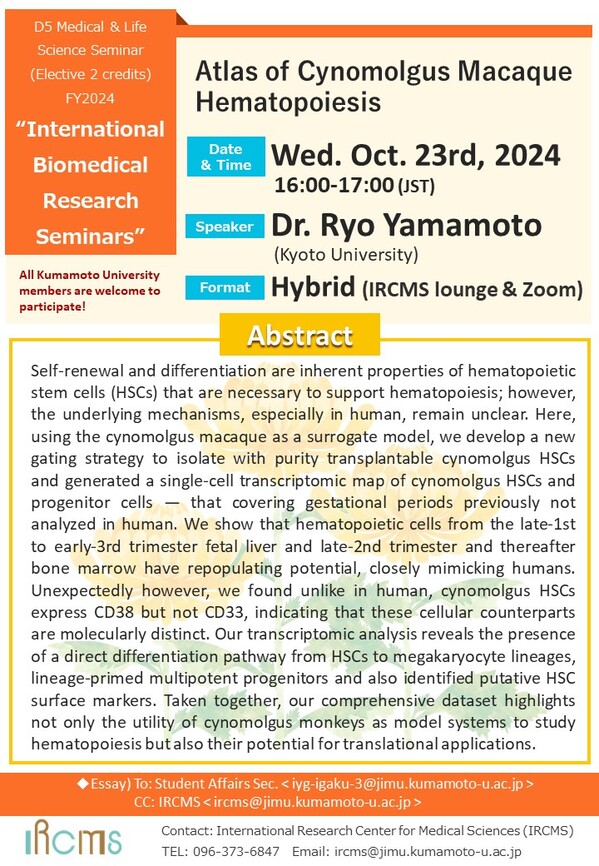- HOME
- News & Events
- [Oct. 23] D5 Seminar-Dr. Ryo Yamamoto (Kyoto University)
News & Events
[Oct. 23] D5 Seminar-Dr. Ryo Yamamoto (Kyoto University)
October 1 2024
The "D5 Medical & Life Science Seminar" course will be offered by International Research Center for Medical Sciences (IRCMS). It will run from May 2024 to March 2025, with lectures given by scientists who are affiliated with IRCMS or in collaboration with researchers at IRCMS. The lectures will be given once a month, in English, and by leading scientists in the relevant research field. Students will be taught: 1) how normal physiological functions are maintained in the human body; 2) how these systems become abnormal under certain pathophysiologic conditions; 3) why stem cells are important in animal development and homeostasis; 4) how stem cell-based approaches can help us understand disease mechanisms and find potential cure for diseases related to stem cell malfunction (e.g., cancer, aging).
Anyone who wants to join is welcome.
For students who have registered for the course, please check your attendance in Moodle.
Date : October 23rd, 2024 (Wednesday)
Format : Hybrid
Time : 16:00 - 17:00 (JST)
Speaker : Dr. Ryo Yamamoto (Kyoto University)
Title : Atlas of Cynomolgus Macaque Hematopoiesis
Abstract :
Self-renewal and differentiation are inherent properties of hematopoietic stem cells (HSCs) that are necessary to support hematopoiesis; however, the underlying mechanisms, especially in human, remain unclear. Here, using the cynomolgus macaque as a surrogate model, we develop a new gating strategy to isolate with purity transplantable cynomolgus HSCs and generated a single-cell transcriptomic map of cynomolgus HSCs and progenitor cells -- that covering gestational periods previously not analyzed in human. We show that hematopoietic cells from the late-1st to early-3rd trimester fetal liver and late-2nd trimester and thereafter bone marrow have repopulating potential, closely mimicking humans. Unexpectedly however, we found unlike in human, cynomolgus HSCs express CD38 but not CD33, indicating that these cellular counterparts are molecularly distinct. Our transcriptomic analysis reveals the presence of a direct differentiation pathway from HSCs to megakaryocyte lineages, lineage-primed multipotent progenitors and also identified putative HSC surface markers. Taken together, our comprehensive dataset highlights not only the utility of cynomolgus monkeys as model systems to study hematopoiesis but also their potential for translational applications.
2-3 Major Papers:
- Atlas of Cynomolgus Macaque Hematopoiesis Shinichiro Oshima, Rahul Sinha, Kazuhiro Takeuchi, Ken Mizuta, Tomonori Nakamura, Ryoji Ito, Ikuo Kawamoto, Chizuru Iwatani, Masataka Nakaya, Hideaki Tsuchiya, Shruti Bhagat, Tomoyuki Tsukiyama, Akifumi Takaori-Kondo, Mitinori Saitou, Yasuhiro Murakawa, Ryo Yamamoto bioRxiv doi: https://doi.org/10.1101/2024.04.22.590220
Flyer: (Click to enlarge)

